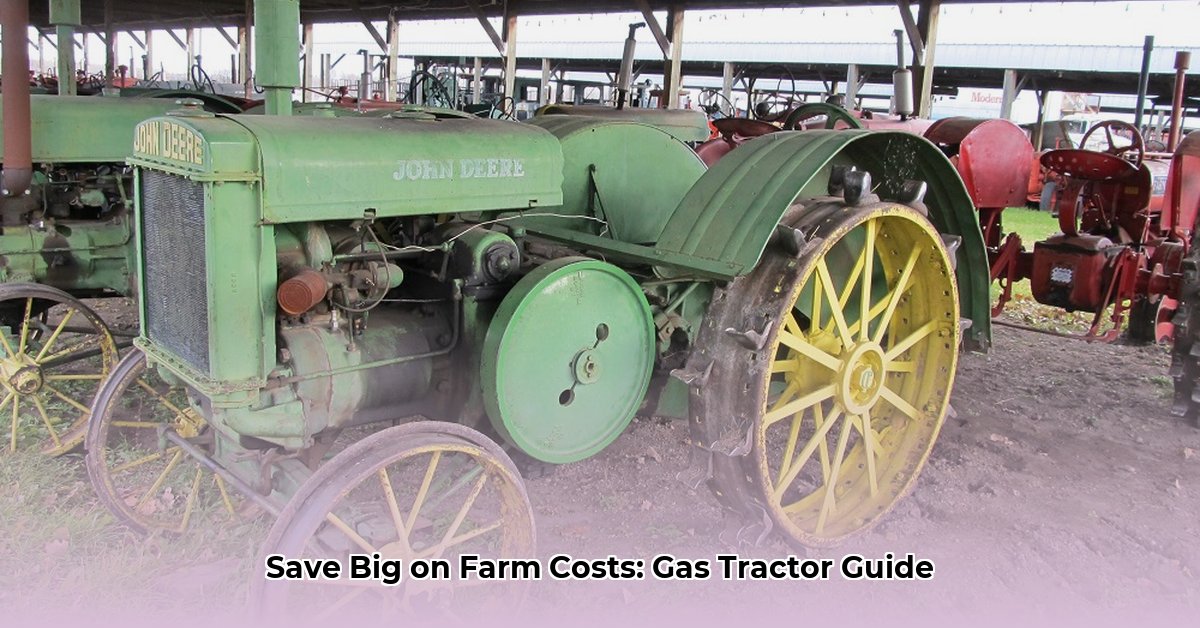
Thinking about buying a tractor? The choice between gas and diesel can seem daunting, but it's a crucial decision impacting your farm's profitability and environmental footprint. This guide clarifies why, despite higher initial costs, diesel tractors often represent a more sustainable and economically viable long-term investment. For hourly lease cost comparisons, check out these tractor lease rates.
Initial Costs: The Upfront Investment
Gas tractors typically boast lower initial purchase prices, making them attractive to farmers with tighter budgets. However, this initial saving shouldn't overshadow the long-term cost benefits often associated with diesel tractors. The higher upfront investment is frequently offset by significant savings down the line.
Fueling Up: Ongoing Operational Expenses
While diesel fuel generally costs more per gallon than gasoline, diesel engines demonstrate superior fuel efficiency, especially during demanding tasks. This means that despite the higher fuel price, the overall fuel cost per acre tilled or per bale harvested can be lower with a diesel tractor. This is particularly true for farms with high annual operating hours. Do you prioritize minimizing fuel expenditure per unit of work? Diesel's efficiency could be your answer.
Maintenance & Repair: Unexpected Costs
Gas tractors often require more frequent maintenance, including regular spark plug changes and filter replacements. Diesel engines, prized for their robustness, generally need less frequent interventions, translating to lower overall maintenance costs. This reduced downtime contributes to increased farm operational efficiency. Are you seeking to minimize unscheduled interruptions? Diesel's reliability shines here.
Tractor Lifespan: The Long Game
Diesel tractors are renowned for exceptional longevity. A well-maintained diesel tractor can easily surpass 10,000 operational hours, significantly outlasting many gas tractors. This extended lifespan drastically reduces the overall cost per hour of operation, making it a compelling consideration for long-term sustainability and return on investment. How important is minimizing long-term replacement costs? Diesel's durability is a key advantage.
Power & Performance: The Muscle Behind the Operation
Diesel engines excel under heavy loads, providing consistent power for demanding tasks like plowing or hauling. Gas tractors are suitable for lighter duties but often struggle to maintain optimal performance when pushed to their limits. A diesel tractor is an absolute workhorse; consider your typical workload carefully.
Environmental Impact: A Complex Equation
Historically, diesel engines have had higher emissions compared to gasoline. However, technological advancements are continuously reducing emissions. The complete environmental impact, encompassing manufacturing, usage, and disposal, is still under active research. Future regulations could also significantly impact the equation. While the picture is evolving, it’s a critical factor to consider in making a sustainable choice.
Adaptability: Expanding Operational Capabilities
Diesel tractors are often more adaptable, seamlessly integrating with a broader array of implements and attachments. This versatility enhances efficiency and expands your farm's potential. A gas tractor might restrict your choices, potentially limiting your farm's growth.
Actionable Intelligence: Tailored Recommendations
Let's break down practical advice for various stakeholders:
Farmers/Landowners: For smaller operations or short-term needs, renting or leasing a gas tractor might be suitable. However, for long-term cost-effectiveness and durability, a diesel tractor represents a sound investment.
Equipment Dealers: Offer diverse financing options to accommodate varied budgets. Emphasize the long-term value proposition of diesel tractors, highlighting their superior return on investment.
Policy Makers: Incentivize farmers to adopt fuel-efficient technologies and fund research into cleaner fuels and sustainable agricultural practices to encourage environmentally responsible choices.
Conclusion: Investing in the Future of Your Farm
While a gas tractor's lower initial cost may seem appealing, the durability, longevity, and efficiency of a diesel tractor usually translate to significant long-term cost savings. Consider your farming operation's scale, workload, and budget when making your choice. Ongoing research in lifecycle cost analysis and total cost of ownership (TCO) studies will continue to refine our understanding of the optimal choice. A well-informed decision today can lead to significant long-term gains for your farm.